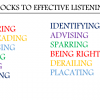Just being quiet while someone talks DOES NOT constitute good listening. To be capable listener, you MUST collaborate in the process by asking questions and getting feedback from the speaker to determine if you are understanding him or her correctly. The goal is to give the speaker the feeling of having been HEARD.
The first step to becoming a good listener is to become aware of the ways in which you distract yourself from giving your complete attention to the task. The following is a list of the twelve blocks to good listening. Some of them you may recognize as ways you typically block yourself from effective listening.
COMPARING
Trying to figure out, while the other is speaking, who is better/has more/does something less, etc. in any number of categories.
MIND READING
Ignoring what the person is saying and trying to figure out what he/she really means. You may just assume that you already know what is going to be said or what the speaker means without using any paraphrasing or asking any questions to confirm YOUR belief.
REHEARSING
You are so busy rehearsing what you are going to say next, that you don’t pay any attention to what is being said.
FILTERING
You hear only that which you want to hear and you screen out everything else.
JUDGING
You discount the speaker’s value for you and, having thus written him/her off, you don’t pay much attention to what he/she has to say.
DREAMING
You listen half-heartedly until something the speaker says sends you off into your own world, thinking about some similar aspect of your own life.
IDENTIFYING
As the speaker shares his/her experience, you relate it back to your own life. (This is similar to dreaming.)
ADVISING
You listen to only a few sentences and then begin to search for and offer advice. Frequently, you miss hearing the speaker’s feelings and/or the full scope of what the speaker hoped to get across, leaving the speaker feeling misunderstood when you offer your premature advice.
SPARRING
You focus on finding things to disagree with and then begin arguing and/or debating with the speaker. The speaker never has an opportunity to feel understood because you are so quick to disagree.
BEING RIGHT
You will go to any lengths to avoid being “wrong,” including reciting a litany of the speaker’s past errors, shouting, rationalizing, making excuses, and accusing the speaker of other transgressions.
DERAILING
You change the subject if you get bored or uncomfortable with the topic being discussed. The more anxious or bored you get, the more frequently you change the subject.
PLACATING
You agree with everything the speaker says in order to be liked or to avoid conflict. You turn on your “Awn-Haw Machine,” and half-listen, but only for questions such as “What do you think?” To which you may respond, “I’m not sure” or “I don’t know, you’re probably right.”

